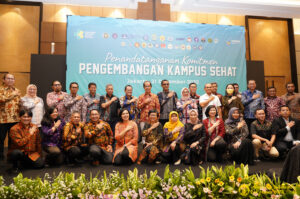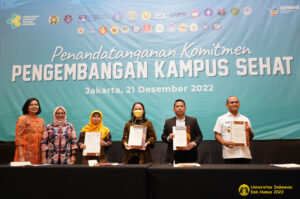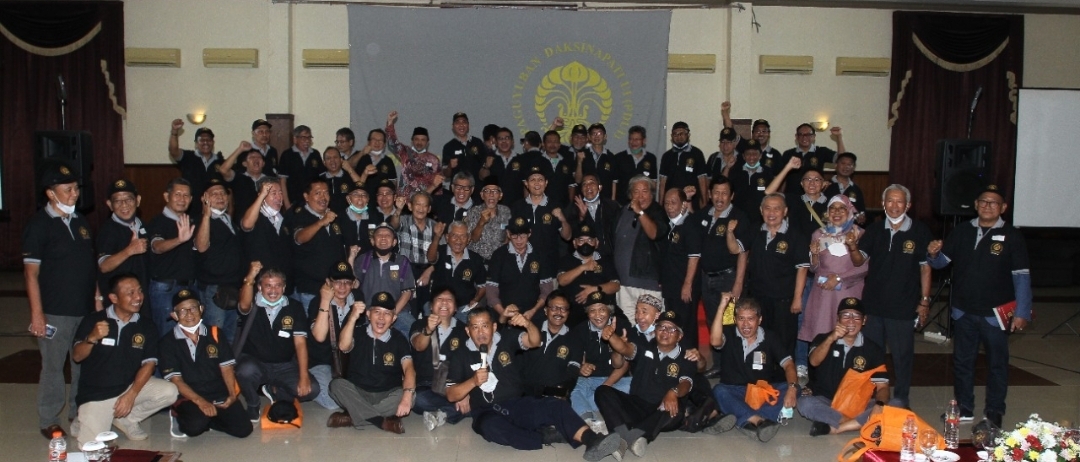
As one of the leading centers of learning and scientific development in Southeast Asia, Universitas Indonesia (UI) continues gives various efforts and initiatives to create a green and healthy campus. For this reason, UI and other universities signed a commitment to develop a Healthy Campus which was held by the General Directorate of Public Health, Ministry of Health of the Republic of Indonesia (Kemenkes RI) at Artotel Suites Mangkuluhur Jakarta, on Wednesday (21/12). This signing was represented by the representatives from 26 universities consisting of six partner universities (Universitas Indonesia, University of North Sumatra, Bogor Agricultural Institute [Universitas Pertanian Bogor], Gajah Mada University, Airlangga University, and Lambung Mangkurat University) and 20 partnership universities.
In his opening speech, the Rector of the Universitas Indonesia, represented by the Deputy Chancellor for Research and Innovation at UI, drg. Nurtami, Ph.D., Sp, OF(K)., said, “Long before the Covid-19 Pandemic was spreaded, Universitas Indonesia had done various efforts to maintain the health and productivity of academics and member of the campus. The Covid-19 pandemic, along with other influencing factors, has prompted the development of new policies, regulations, standards and programs. In addition to creating a Healthy Campus, various initiatives that are currently being held are also part of the effort at developing disaster preparedness. In an integrated manner, Universitas Indonesia builds a green, sustainable, healthy and disaster prepared campus.”
In realizing this, drg. Nurtami said that UI had involved many experts from various faculties. Some of the initiatives that have been implemented by UI, including the energy transition, such as utilizing solar energy and processing waste to produce energy, maintaining green open spaces, building more green building and smart class, structuring the transportation system and providing sports facilities to increase physical activity, promotion of occupational safety and health, implementation of routine health screening , chronic disease prevention, especially for lecturers and senior staff, mental health coaching, and support for persons with disabilities. “We also strictly implement Zero Tolerance provisions for cigarettes, alcohol, drugs (narcotics, psychotropics and other addictive substances), sexual harassment and violence, gambling and unsafe driving. Various sports and arts clubs are available on campus to support healthy social interaction among campus residents,” said drg. Nurtami.
On the same occasion, the Director of Health Promotion and Community Empowerment, Ministry of Health, drg. Widyawati, MKM., said, “We will support and we will continue to assist in every activity held (Healthy Campus program). The hope is to achieve a healthy Indonesia, a healthy community, not only campuses but also all healthy Indonesian people with our meeting today to make a joint commitment. Hopefully this commitment will become a reference and guide for us.” Head of Health Promoting University Network Indonesia, Prof. dr. Yayi Suryo Prabandari, M.Sc., Ph.D., believes that higher education as a place for the education of the younger generation, a gathering place for productive age groups has the potential and added value to contribute to improving public health. Higher education plays a role as the main actor of development, developing innovative ideas, as a driving force (
agent of change), advocate for programs, and contribute to policy development. In its application, universities can refer to the pocket of empowering a healthy campus for its development steps.
In its application, universities can refer to the pocket of empowering a healthy campus for its development steps. Prof. Yayi added, several stages in implementing a Healthy Campus include need assessment, target assessment, planning, implementation, and monitoring and evaluation.

The Healthy Campus Program is a program developed by the Ministry of Health and the Ministry of Education, Culture, Research and Technology in 2019 with the aim that the education sector can play an active role in realizing Healthy Indonesia through promotive-preventive efforts within the campus environment. The development of this program starts with the preparation of guidelines with experts as a reference for the implementation of a Healthy Campus. On Friday, 4 October 2019, the Healthy Campus program was launched by the Indonesian Vice President, Drs. H. Muhammad Jusuf Kalla at the Universitas Indonesia, Salemba. This year, the Ministry of Health is supported by six universities which are used as Satellite Colleges.
In the report on the implementation of activities submitted by the Head of the Productive Age and Elderly Behavior Working Team, the Indonesian Ministry of Health, drg. Marlina Ginting, M.Kes., this event is fully supported by the Healthy Campus Team from the Universitas Indonesia in collaboration with the Ministry of Health as a partner with funding from the General Directorate of Public Health in 2022. “The development and implementation of the Healthy Campus is in line with Presidential Instruction No. 2017 concerning the healthy living community movement which emphasizes that the government encourages all stakeholders to support strengthening promotive-preventive efforts that are carried out in an integrated manner involving multi-sectors with an organizational approach including universities,” said drg. Marlina.



